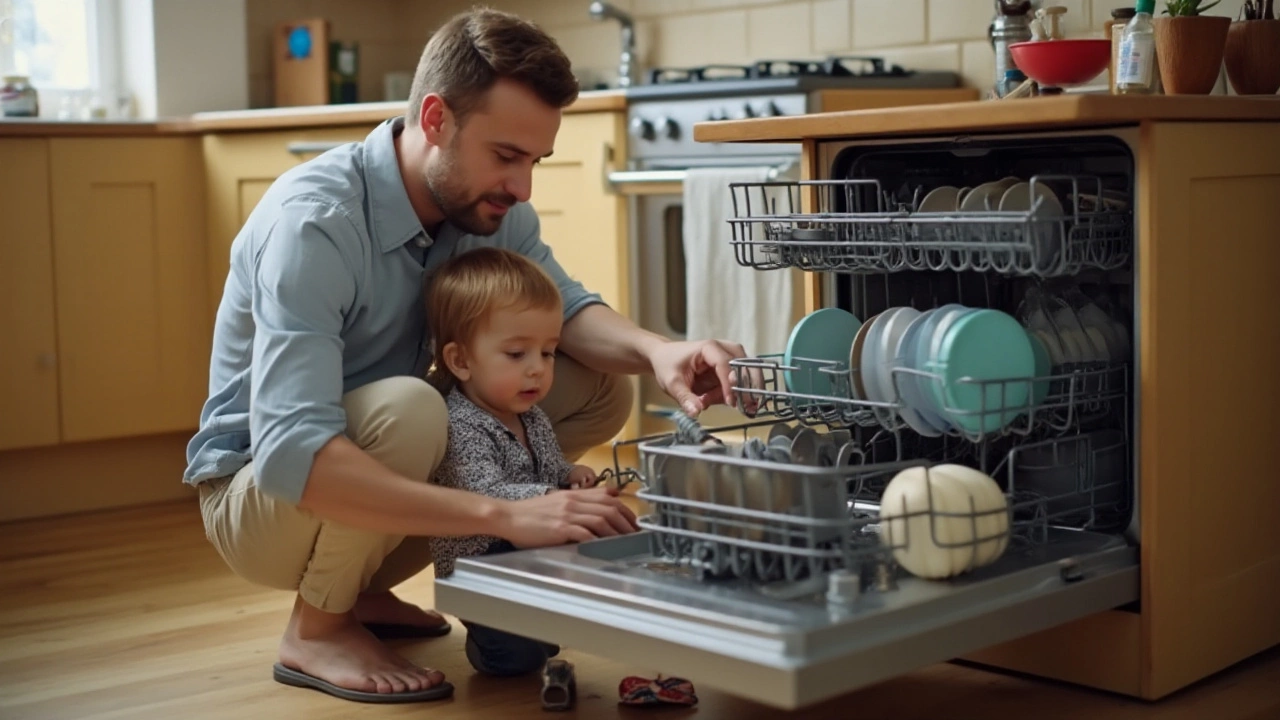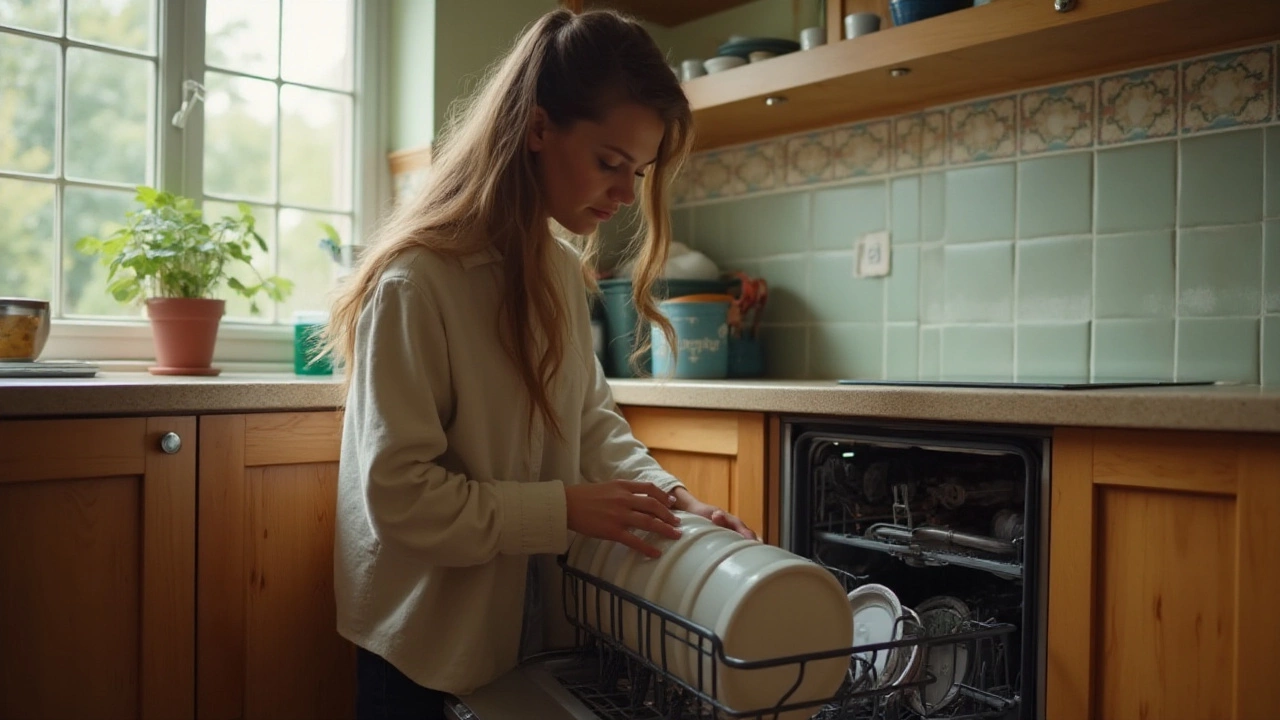Making the decision between repairing or replacing a dishwasher can feel like navigating a maze. With the convenience that modern dishwashers bring, it's no wonder we're keen to keep them running smoothly for as long as possible. However, when they start throwing tantrums, it can leave us scratching our heads about the next steps.
Before diving into decisions, it's important to consider a few key factors: the nature of the problem, the dishwasher's age, and repair costs. Sometimes, a simple fix is all that's needed, while other times, replacement might be more financially sound.
Join us as we explore common issues, evaluate costs, and share tips on when to roll up your sleeves and when to call in the pros. This guide is all about helping you make the best choices for your home and your wallet.
- Understanding Common Dishwasher Problems
- Evaluating Repair Costs vs. Replacement
- Signs Your Dishwasher Needs Professional Help
- DIY Fixes and When to Call a Technician
- Tips for Extending Dishwasher Lifespan
Understanding Common Dishwasher Problems
When it comes to household appliances, dishwashers are a crucial cog in the daily routine of many families. They save time, conserve water, and generally make life a bit easier. However, like any other appliance, dishwashers are prone to hiccups. Understanding these issues is a big part of figuring out whether you should opt for a repair or start browsing for a new model. One of the most common problems users encounter is a dishwasher that doesn’t clean dishes properly. This can be attributed to several factors—anything from blocked spray arms to a failing pump or motor. Hard water build-up and improper loading also play a role. It’s quite normal for lids with stray food bits or tightly packed plates to evade a thorough cleaning, leaving users frustrated as they unload.
Another frequent issue is water not draining at the end of a cycle. This is often caused by a clogged filter or drain hose. In more severe cases, it might result from a problem with the pump or the presence of a faulty check valve. A dishwasher with standing water can lead to a smelly mess if not addressed promptly. Although these issues are common, a surprisingly high number of homeowners let them persist without realizing there’s a fix.
As appliance expert John Carey notes, "A lot of homeowners ignore minor glitches, turning what could be a quick fix into a costly repair down the line."
Non-functioning dishwashers are another headache. If your machine doesn’t start, it could be as simple as a tripped circuit breaker or a poor connection at the electrical panel. On the other hand, it might hint at more serious issues like a faulty door latch or bad control mechanisms. Then there are leaks, which are usually easy to spot but require quick action to prevent water damage. These can happen due to improper alignment, worn-out door gaskets, or loose connections.
For those grappling with noisy operations, the culprit could be an obstruction among the internal parts or worn-out bearings. While some noise is normal, anything too loud or unusual can indicate trouble. With consistent maintenance and keen observation, many of these problems can be managed effectively. Regular cleaning, checking for obstructions, and keeping the unit level can prevent a host of issues.
Evaluating Repair Costs vs. Replacement
When your dishwasher starts acting up, the immediate thought might be to call a repair technician. However, before you spend your hard-earned money, it's essential to weigh the repair costs against the expense of a new appliance. The average cost of repairing a dishwasher in New Zealand can vary significantly based on the problem, but you might find yourself paying anywhere from NZD 150 to NZD 300 for common issues. This can certainly add up, especially if your appliance is older and more prone to breakdowns.
Age matters a lot in these decisions. A dishwasher that's over eight years old might not be worth sinking too much money into. This is because newer dishwashers are usually more efficient and packed with features that an older model simply can't match. Energy efficiency standards have improved over the years, so sometimes investing in a new model will save you money on your power bill in the long run. According to a Consumer Reports survey, nearly 30% of dishwashers required repair within the first five years, so also consider if your model is in that problematic category.
"Sometimes the cost of multiple small repairs in an old machine can soon equal the cost of a replacement," suggests appliance expert Mark Johnson from Consumer Reports.
Beyond age and minor fixes, another critical area to consider is if the problem is recurring. If the same issue keeps popping up despite multiple repairs, you might have a lemon on your hands, or there may be a deeper issue that's not being addressed. In such cases, replacing the appliance could be more cost-effective and less frustrating. When repair costs approach half the price of a new dishwasher, that's often a sign it's time to consider replacement. But, on the flip side, if your appliance is relatively new and the repair isn't costly, fixing it is likely the better choice.
Some manufacturers offer extended warranties which can alleviate the cost of repairs, so check whether you're covered before making a decision. It might also be useful to explore what warranty coverage a new machine offers before committing. On the monetary side, weigh the costs against your budget and the potential savings in energy efficiency. Often, newer models have improved water and power usage, translating into lower utility bills. Evaluate how significant the savings could be over time to justify a new purchase.
In summary, making the decision between repairing or replacing your dishwasher isn't merely about upfront costs. Consider the age, efficiency, and recurring issues. Each factor plays a crucial role in ensuring you get the best value for your money while maintaining the convenience that these steadfast kitchen appliances bring to your home.

Signs Your Dishwasher Needs Professional Help
In many homes, the dishwasher is a trusty kitchen aide that silently takes care of the dirty work, so when it starts acting up, we're often left scrambling for answers. Recognizing when to call in a professional can save you both time and money, and prevent minor issues from snowballing into costly repairs. Some of the most telling signs include strange noises, leaks, or when dishes just aren't coming out clean. If your dishwasher sounds like a rock concert of clanks and hisses, there might be something wrong with the pump or motor. These sounds signal that components might be loose or worn out, and professional attention is definitely needed.
Leaking is another major red flag. While not every leak spells disaster – it could be due to something as trivial as a loose door gasket – consistent or large pools of water around your dishwasher probably indicate more serious plumbing issues. If you spot water damage or persistent puddles, seeking expert help is a prudent step to take. Not only can unchecked leaks cause further damage to your kitchen floors, but they can also hike up your water bill unexpectedly.
Then there are the cleaning issues. If you notice your dishwasher not cleaning as it once did, leaving residues or food particles, it’s time to assess whether the problem lies beyond a simple clogged filter. Dishwashers rely on optimal water pressure and heat, so faulty heating elements or malfunctioning water pumps can severely affect performance. Professionals have the tools to correctly diagnose and fix these inadequacies to restore the appliance to peak condition.
Perhaps you've noticed your dishwasher being more temperamental with its cycles. Skipping cycles, refusing to drain properly, or resetting on its own are signs of electronic control board issues. Now, unless you're comfortable with electronics and wiring, it's probably best to leave this to professionals. Electronics are sensitive, and tinkering with them can often lead to unintended consequences. You don’t want to risk voiding your warranty or causing more significant damage.
"According to Consumer Reports, about 30% of dishwashers need repair within their first five years. Professional help not only brings expertise but they might even catch potential problems early on," says John Doe, a home appliance industry veteran.
Lastly, stinking smells wafting from your dishwasher each time you open it might indicate mold or bacteria build-up, which isn’t just unpleasant but unsanitary. A professional can ensure thorough cleaning and advising on routine maintenance steps to keep things fresh. It’s important to remember that keeping the dishwasher healthy also translates to maintaining your health by effectively eliminating germs.
So, when your reliable dishwasher starts showing signs of trouble, trust these indicators. A proactive approach in seeking professional help can lead to a longer-lasting, efficient appliance, serving you well for years to come. If nothing else, easing your mind by knowing it's in good hands is worth the call.
DIY Fixes and When to Call a Technician
As the saying goes, “A stitch in time saves nine,” and this can easily apply to dealing with dishwashers. Tackling issues head-on with some DIY skills can not only save money but also extend the life of your trusty appliance. However, knowing how to distinguish between a minor hiccup and a call for professional help is crucial. First, let's talk about some common DIY fixes. One of the most frequent problems is a dishwasher not draining properly. This can often be resolved by inspecting and clearing the filter located at the bottom of the appliance. Food debris can clog the drainage, causing water to pool. Cleaning the filter regularly can prevent this problem.
Another common issue is dishes not drying well. Ensure that the rinse aid dispenser is filled, as this helps water slide off dishes more effectively. If you notice a strange odor, check the door seals and wipe them down, as trapped moisture and food particles can contribute to the smell. Addressing these with routine clean-ups can keep odors at bay. But when should you step back and call a professional? If the dishwasher starts making unusual noises such as grinding or squealing, it might be an indication of a motor or pump malfunction. Attempting to fix these could result in further damage.
An informative source,
Home Appliance Repair Magazine, mentions, “While DIY efforts are commendable, recognizing the limit of your expertise is what ensures the safety and functionality of your home’s appliances.” Therefore, if electrical problems occur, like the machine not powering on or tripping circuits, it is wise to enlist a technician's expertise. They have the tools and knowledge to troubleshoot complex issues without putting themselves or the appliance at risk.
Here are some quick tips on when to leave it to the professionals: if a part needs replacing, if water leaks persist, or if software issues arise (although rare, they do happen with modern machines). Always ensure the technician is certified and has a good track record. Lastly, simple maintenance like running the empty dishwasher with vinegar or a commercial dishwasher cleaner every month helps keep things running smoothly. Appliance maintenance might seem daunting, but it’s an investment into your kitchen workflow. By handling minor issues yourself and knowing when to seek help, you ensure that your dishwasher continues humming along without interruption.

Tips for Extending Dishwasher Lifespan
To nurture and extend the life of your trusty dishwasher, there are several effective strategies you can adopt. A dishwasher is a faithful ally in the kitchen, tackling one of the most dreaded household tasks with aplomb. Yet, like any piece of machinery, it needs a little TLC to function optimally over the years. The first step in this journey is regular maintenance, which can prevent minor issues from snowballing into major problems. By regularly checking seals, hoses, and other components, you ensure everything remains in prime working condition. This proactive approach not only delays wear and tear but also helps detect potential issues early.
Secondly, it's vital to keep your dishwasher clean. It might seem counterintuitive, considering its primary job is to clean, yet this machine needs its own scrub-down from time to time. Food particles and soap scum can accumulate, potentially clogging parts and affecting performance. Cleaning out the filter regularly, wiping down the door seals, and running an empty cycle with a dishwasher cleaner can work wonders. This simple routine ensures efficiency and can significantly extend its lifespan.
Moreover, wise loading patterns can also spare your dishwasher from undue stress. Overloading may seem like a time-saver, but it can actually damage the appliance and reduce its effectiveness. By arranging dishes properly, ensuring that they don’t block water sprays, and spacing items so that water and detergent can reach all surfaces, you enhance cleaning efficiency and prolong the machine’s life. It’s also crucial to scrape off food bits rather than rinsing dishes thoroughly, which can save energy and maintain pressure balance, reducing strain on components.
According to experts at Consumer Reports, 'loading dishes correctly not only optimizes the wash cycle but also helps in maintaining the longevity of your appliance.'
Another factor to consider is the quality of water you use. Hard water can be particularly troublesome, leading to mineral buildup that could compromise the dishwasher's performance. Consider investing in a water softener or a rinse aid to combat this issue. Using high-quality detergents designed to tackle hard water stains can also contribute to better maintenance. The right cleaning aids protect the surfaces and internal parts of the dishwasher, ensuring smoother and more effective cycles.
Finally, it's sometimes worth upgrading individual elements of the dishwasher, especially with models that allow for replacement parts. Timely replacement of racks, cutlery baskets, or even seals can make a significant difference. These smaller investments can keep your appliance ticking along without requiring a new purchase. Keeping an eye on developments in appliance maintenance can also provide insights into newer, more efficient ways to manage your machine, ensuring that it remains a reliable kitchen companion for many more years.



